Lisa Dawn's Blog: The Princess Blog, page 23
June 23, 2023
Review: Time Princess - Mysteries of Zentico
Time Princess recently released a poll on social media asking whether fans prefer fantasy or urban stories. This provided better language for me to define the discrepancies between the visual novels they've released in the past and the ones that have come out recently. Mysteries of Zentico, the newest story in the game, falls yet again into the urban category. It is the first story that the dress-up app that was released in two separate parts. There are many other great stories in this game that had open endings and could have benefitted more from a tiered release. Though I can understand the necessity of the extended release time for this particular story due to its length and overly complicated plot, it was not one that I was eager to complete for those same reasons. No matter how many new chapters I unlocked, I still had a limited understanding of what was going on and didn't care much about any of the characters.
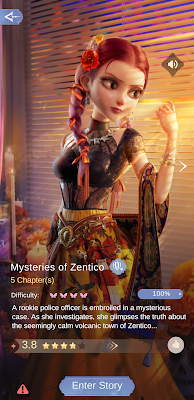
Mysteries of Zentico takes place on a fictional volcanic island inspired by Latin American culture, which is a first for this game. I liked that they selected a setting and culture that they hadn't explored before to increase the variety of wardrobe options, but it felt more like an aesthetic choice than something that was used to drive the plot. Unlike Elena of Avalor, which directly incorporates Aztec mythology and Mexican traditions into its storylines, Mysteries of Zentico follows a completely original lore that can't decide what it wants to be. At first, it looks like a traditional cop drama in which the player takes on the role of a policewoman named Lupe who must assist clients in investigating disappearances and potential murders. The deeper the player gets into the story, the more supernatural it becomes, incorporating things like soul possession and time travel. Yet, none of these elements are fully explored because the story branches into different sections that teach the player about the visual novel's companions while sprinkling bits of its mythology in on the side, resulting in several head-scratching outcomes that rarely feel fulfilling.
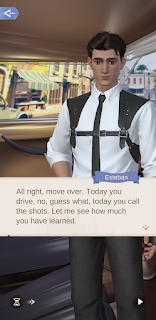
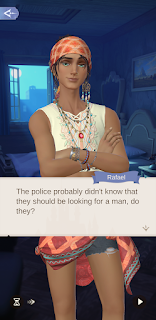
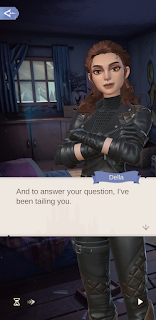
The three different paths that the player chooses at the end of the first chapter determine which of the three companions' stories they will explore. Esteban was by far my favorite of the three as he was the only character that even came close to resembling a love interest. He is hired at the beginning of the story to train Lupe as a cop, but their partnership quickly grows into something more. Though he is the most appealing of the three, his story is the least complex, making it feel out of place in the larger context of the visual novel. Rafael is a genderqueer troublemaker with a torrid history of working as a fortune teller with a traveling circus. He seems to be emotionally troubled, which is why Lupe wants to help him get his life back together, but I had a difficult time determining what his goal was. Della, the third companion, doesn't even show up until after the player has completed everyone else's route, which makes her the hardest character to get to know. She has a secret identity known as the Rose Rider and serves as a mentor figure to help Lupe navigate the supernatural elements of the story once the player has unlocked them.
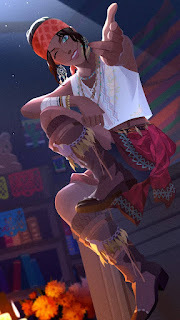
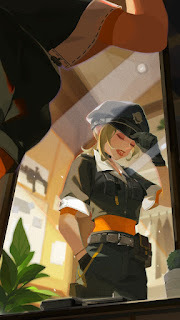
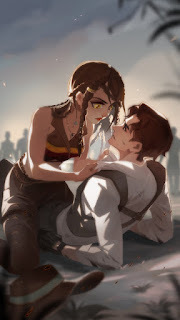
The clothes in this story add new inspiration to the infinite Time Princess wardrobe with some Latina flair. There is, of course, the obligatory police uniform for Lupe as well as some brightly colored flowing skirts and gowns that celebrate the vibrance of Latin American culture. There are a few casual looks as well. My favorite is the butterfly gown that includes flowing pink hair, red rose-accented accessories, and skeleton gloves and tights that are reminiscent of Dia de los Muertos. I also like the long skirts and shawls that make me think of flamenco dancers. The new looks celebrate the beautiful fashions of Mexico in a way that the game hasn't explored previously. It's a lot of fun that each new story tries to incorporate a different culture and period of fashion. I wish some of this culture had been incorporated more into the plot of this particular visual novel, but the story was focused solely on the urban cop drama and weird volcano time travel lore instead.
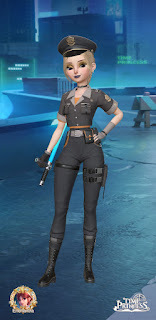
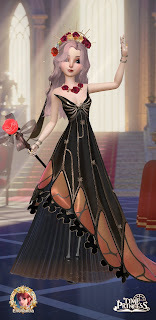

Mysteries of Zentico is a visually stunning addition to Time Princess, with a diverse range of vibrant and culturally inspired fashion choices. However, the story falls short in terms of plot coherence and character development. The mishmash of supernatural elements and urban cop drama makes it an uneasy fit, and the branching character paths leave some arcs feeling underdeveloped and unsatisfying. While the setting and cultural influence of the game are refreshing, it would have been better to see them more intentionally used to drive the story. Overall, Mysteries of Zentico may capture players with its gorgeous wardrobe options, but it fails to deliver a compelling and coherent narrative. Have you been enjoying the urban stories the game has released of late, or would you prefer to see them return to fantasy and historical figures? Let me know in the comments!


June 18, 2023
Review: Ugly: The Stepsister's Story
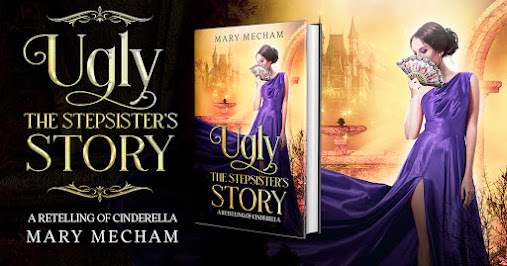
Truly is a refined lady of the court who lives in the castle with her parents and sister. Her master linguistic skills make her a valuable resource to the kingdom's foreign relations, and her compassion and sincerity make her a perfect match for Prince Curtis, who is second in line for the throne to his brother. She seems to have the perfect life until a horrible event takes place one day on a diplomatic mission when she is attacked by terrorists, and her face is marred beyond recognition. She is understandably traumatized by these events and becomes a recluse, refusing to see Curtis again or even respond to his letters, believing that he could never love her if he saw what she looked like after the accident. The book has some strong Phantom of the Opera romantic vibes with a sympathetic heroine who is worth rooting for.
The character dynamics are handled extremely well. It is crystal clear why Curtis has feelings for Truly and vice versa. They are both compassionate people who put others before themselves and don't believe in the false pretenses of royal life. Truly's sister, Comfort, is so understanding and supportive of her that she made me wish I had a sister just like her. The only character I didn't like was Cynthia, who represents Cinderella in this story. I understand that because this was a role reversal, in order to like one character, another would have to seem less appealing, but Cynthia had virtually no redeeming qualities. She was so cruel to Truly and kept calling her ugly over and over again even after her father explained everything she had been through. Yet, Truly continued to forgive her and was way more kind to her than she actually deserved.
I enjoyed how Mary Mecham incorporated elements of the Brothers Grimm interpretation of "Cinderella" with the magic tree that members of the family would sneak gifts inside of for the others to find. It was a fun twist that provided a more logical explanation for the supernatural elements of the fairy tale. I also liked that there were two princes, similar to Andrew Lloyd Webber's interpretation of the story, so there didn't need to be a love triangle to create additional barriers between Truly and Cynthia. This also proved that Truly cared about Curtis as a person and not because he was a prince. Truly felt more like a "Cinderella" figure than Cynthia because she recovered from a horrible situation and learned to open her heart to love and happiness again.
Ugly: The Stepsister's Story by Mary Mecham is a captivating and unique retelling of "Cinderella" that delves into the perspective of the ugly stepsister. Mecham handles trauma and disabled representation with sensitivity and care, while also crafting a compelling romance. The character dynamics between Truly, Curtis, and Comfort are expertly handled, although Cynthia's lack of redeeming qualities may be off-putting to some readers. The use of the magic tree and two princes adds depth to the story, making it a must-read for anyone looking for a fresh take on a classic fairy tale. Overall, this book shows Mecham's prowess in creating innovative retellings with strong character development, making her an author to watch in the future.June 13, 2023
Disney Junior's Ariel Enters The Little Mermaid Multiverse
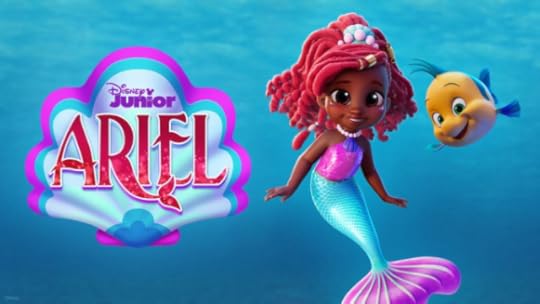
As its own separate property, it sounds like a cute idea. The animation style blends well with the mermaids feature in Sofia the First or Elena of Avalor, so there is potential for a crossover with some of my other favorite shows. Another thing it has in common with Elena of Avalor is that this version of Ariel has a similar ability to the one Elena unlocked in The Magic Within special. Like Elena's dress, Ariel has an enchanted tail that shimmers and changes colors based on her mood. The series takes place in the Caribbean-inspired kingdom of Atlantica, which until now had not been referenced in any of the live-action properties, and will follow Ariel's exploration of human artifacts like "a big floppy hat, squeaky rubber duck, and whisk." It sounds like the series will chronicle how she began building up the massive collection of human things in her grotto, which is a pretty neat idea for a preschool series, especially if each episode focuses on a single item and educates children about its functions. I could see it having a more formulaic structure like Doc McStuffins or the new Netflix series Princess Power, which, unfortunately, do not hold much appeal for older audiences.
My biggest concern about this show is that it has the potential to make everyone forget the wonderful animated series from the '90s, which is already beginning to fade into obscurity. The Little Mermaid: The Animated Series had beautiful songs, animation, and stories, and gave us a chance to get to know Ariel's sisters better. One of the biggest discrepancies between the live-action and animated Little Mermaid movies was the names and appearances of Ariel's sisters. Disney Junior's Ariel is touted as featuring fan-favorite characters like "King Triton, Ursula, Sebastian, and Flounder as well as exciting new additions." It's possible the new series will exclude her sisters entirely, but that would be disappointing considering how much less screen time they got in the remake and how estranged they were as a family in their later years according to the prequel novel, Against the Tide. Since both this series and Against the Tide are meant to be prequels to the live-action adaptation specifically, I also wonder if the new series will reference anything about the Protectors, Residents, or MerSongs that were introduced as important lore in the novel or if it was actually a complete work of fanfiction, in which case it should never have used the Disney versions of the characters in the first place.
Another new element that this series introduces into the world of The Little Mermaid is Caribbean culture with the help of Dr. Patricia Saunders, a cultural consultant on the show, and Sean Skeete as the Caribbean music consultant. This implies that the musical numbers from the series will be more Caribbean-inspired as opposed to the musical theater-style songs we've heard in the previous animated movies and series. While I'm all for representation, I find it a bit odd that they need a cultural consultant for a fantasy show about mermaids that takes place in the ocean. Considering how many changes the newer properties have made to the animated Little Mermaid series of the early '90s, it is my opinion that this show would work better as an original property with new characters like Elena of Avalor, which focused on Aztec lore, to give preschoolers a chance to dive into the mythology and lore of Caribbean and mermaid culture. I'm also surprised at the use of the name Atlantica for Ariel's kingdom, which was previously interpreted as an underwater Mediterranean kingdom in the animated properties, whereas the more Caribbean-inspired kingdom from the live-action remake was referred to as Carinae in the tie-in novels.
The announcement of Disney Junior's upcoming Ariel series raises a plethora of concerns and questions for fans of the franchise. While the animation style and design of the characters appear to be cute and appealing for preschoolers, the potential multiverse plotline and discrepancies with previous renditions of the story could be jarring for long-time fans of Disney's The Little Mermaid and its related properties. The addition of Caribbean culture and music is an interesting development, but it is unclear if it will fully integrate into the story or simply serve as a surface-level representation. Ultimately, the announcement of this series feels like a missed opportunity to create an original property that explores Caribbean and mermaid culture in a way that is more authentic and respectful. While it remains to be seen how the series will address these concerns, it is important for fans and creators alike to continue to push for meaningful representation and accurate portrayals in media. How do you feel about Disney Junior's Ariel? Do you think it will be a necessary update for modern children to the original animated series, or would you prefer to see newer mermaid properties such as Rainbow's Mertropolis, which is currently in the works? Let me know in the comments!
June 12, 2023
The Legacy of Sleeping Beauty: Is She As Passive as We Think?
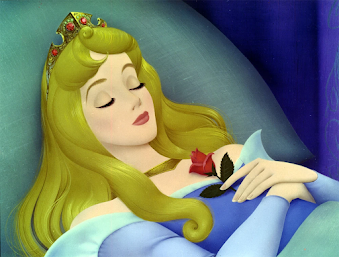
Determining how much Sleeping Beauty has requires a closer look at the three most well-known versions of the fairy tale: "Little Brier-Rose" by the Brothers Grimm, "The Sleeping Beauty in the Wood" by Charles Perrault," and the infamous "Sun, Moon, and Talia" by Giambattista Basile, in which the unfortunate princess is taken advantage of in her sleep by a king and awakens to find that she gave birth to two babies. The Grimm version is the most basic one that ends right after the princess wakes up, pinning her as a classic damsel in distress whose story wrapped up immediately upon her rescue. On the other hand, the Perrault and Basile versions both give the cursed maiden two children that a wicked queen tried to turn into food. In the Perrault version, the mother of the prince that Sleeping Beauty weds is a hungry ogre that wants to eat her children, and in the messed up Basile version, the king's jealous wife tries to convince a servant to cook the unfortunate maiden and her children and covertly feed them to the philandering king. Though the sleeping princess still relies on the help of outsiders to protect her children in both of these versions, they imply that the majority of her agency comes from being a mother and doing everything in her limited power to protect her children, something that the Disney versions of the character never establish.
The most popular adaptation of this story is the 1959 animated Disney movie, which calls its princess Aurora and gives her very little agency over her life. In fact, the fairies are the most active characters in the film since they are the ones who set everything into motion. It makes sense, therefore, that the live-action reimagining focuses on the wicked fairy Maleficent rather than Aurora, who is more of a side character in this version. Though Maleficent is portrayed as misunderstood in her movies, none of the fairies allow Aurora an opportunity to take charge of her own story. The Three Good Fairies--Flora, Fauna, and Merryweather--lie to her about her name and identity for most of her life and never tell her about the curse, which gives her little opportunity to defend herself from it. Even when she falls in love, she is told she must marry a prince that she believes she never met, relinquishing control from that aspect of her life as well. The fact that the prince happens to be the same man she fell in love with falls the most closely into the sexist "Be pretty, girls, and things might work out" territory. The ambiguity of the film's protagonist may have contributed to Sleeping Beauty being the only official Disney Princess movie that was considered a flop at the time of its release. Regardless, Aurroa's lack of agency in her story never stood in the way of her becoming one of the most beloved Disney Princesses of all time.
When Sleeping Beauty first went into production, Walt Disney was concerned that the plot was too similar to Snow White and the Seven Dwarfs, which he tried to redeem by giving it a drastically different art style that resembles medieval tapestries. The thing that makes it stand apart the most from Snow White and many other Disney Princess movies is the importance of faeries in its plot. People like faeries, especially princess fans, which is likely another reason that the Maleficent movies focused more on that world and why Tinker Bell eventually got her own series of books and movies that were separate from Peter Pan . Maleficent 2: Mistress of Evil came the closest to incorporating the epilogue of Perrault's fairy tale in which the prince's mother turned out to be a murderous ogre. Instead of trying to kill Aurora's nonexistent children, they made Prince Phillip's mother a tyrant who went around murdering fae and other magical beings, which was a clever way of paying homage to the one element that makes "Sleeping Beauty" stand apart from other Disney Princess movies as well as referencing a lesser-known aspect of the fairy tale. The concept of princesses receiving magical gifts at birth is one that came up in several stories from Andrew Lang's Fairy Books. One of my favorite fairy tales from these books is "Fairer-than-a-Fairy." This story starts out similarly to "Sleeping Beauty" but gives the princess more agency, making for a more engaging story overall.
At the end of the day, I am remiss to confess that Sleeping Beauty is among the most passive of the mainstream fairy tale princesses. She is so passive that Disney's live-action remake committee was unable to redeem her as a title character and focused instead on the more active fae villain character for their adaptation. However, as a princess who was cursed at birth and usually had this information withheld from her, Sleeping Beauty was given very little opportunity to take control of her story and can hardly be blamed for her victimhood. Still, Aurora's grace, elegance, and innocence are an inspiration to many. For those of you seeking a more active alternative to this character, I strongly recommend checking out the story "Fairer-than-a-Fairy," which I would love to see turned into a film adaptation someday.
June 11, 2023
Review: Kingdom of Cinders
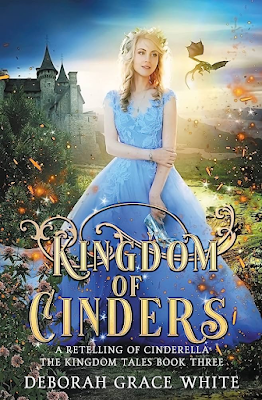
Penny never asked to be born with magic, nor did she want it. In fact, she was so ashamed of her powers that she hid them from both her parents until their dying days. Unfortunately, that left her stuck with a wicked stepmother and two selfish stepsisters (one more so than the other) with no way out of her miserable life. When her stepmother sends her on a delivery to the castle with her father's death still fresh on her mind, Penny accidentally catches the eye of Prince Rian, who was already skeptical of the kingdom's unjust policies toward people with magic. Though Penny tries to make herself as scarce as possible, the prince is taken with her and seeks her out to deliver the payment for her task. It doesn't help that a fellow enchantress named Lady Amaranthe who knew about Penny's powers is determined to bring the two together. As a result of their unlikely friendship, Penny agrees to attend Prince Rian's series of betrothal balls where his parents are determined to find him a wife. She continues to carefully hide her powers for fear of the danger they could bring to them both.
As far as adaptations go, I appreciate that Deborah incorporated more elements of the Brothers Grimm version of the fairy tale than the more popular Perrault version such as holding multiple balls and picking up lentils as one of her tasks. Lady Amaranthe serves the role of the Fairy Godmother effectively with her ability to alter appearances and give Penny a suitable look for the ball. She also serves as Penny's mentor by helping her to hone her magic. The original elements of the book are woven masterfully into the story. The reason the "Cinderella" fairy tale is so popular is that it shows that any girl can be a princess, even the most unlikely of commoners. Here, not only is marrying Penny a challenge for Rian because of her social standing, but also because of her powers, which are enough to have her arrested on principle. Like Deborah's other books, this story incorporates dragon lore by portraying a dragon who talks to Penny about her magic in her dreams. It was a clever way to tie this story into her other books as well as a nice treat for those of us who have read some of them already.
One of the most important elements for any "Cinderella" retelling is the love story, which I think was handled well here. With chapters from both Penny and Rian's perspectives, we get a good understanding of both their fears and desires. Rian fell for her a little quickly, but that's normal in these types of stories. Penny's magic served as the biggest obstacle in their relationship, which provided just the right amount of drama for a story that has been told so many times. The surprise twist at the end that I didn't see coming at all sealed the deal for this book not being just another trite "Cinderella" retelling. Though the "magic ban" trope has been done in the past, it worked well in terms of adding new life to an old story. I also liked that Penny's magic gave her a connection to a dragon that tied her tale into the larger overarching fantasy universe of Deborah Grace White's books.
While it isn't one of the best books Deborah Grace White has ever written, Kingdom of Cinders holds its ground as an original "Cinderella" retelling full of magic, intrigue, and surprises. It presents a new interpretation of a familiar character who has more magic than she knows what to do with. Elements like the unfair treatment of magic users, a more proactive fairy godmother, and a nicer stepsister breathe new life into this classic story. If you are looking for a "Cinderella" retelling that has just enough original aspects to make it feel new again, this is a good option. If you are a fan of princesses and fantasy and are looking for something more original, I strongly recommend checking out Deborah's other series including The Vazula Chronicles, The Kyona Legacy/Chronicles, and The Singer Tales.
June 10, 2023
Story Saturday: Operation Little Mermaid
"Princess Helena!"
I was so startled by the voice of one of my maids that I twirled straight into the mannequin. It fell directly on top of me, burying me under fifteen pounds of crinolines, petticoats, and lace. I hit my head so hard that the maid came bolting into the room to check on me.
"Oh no! Not today of all days! Can you hear me, Princess?"
I heard her voice somewhere in the back of my mind, but I couldn't find the strength to respond. While my body was swimming in a sea of fabrics, my mind was somewhere else entirely. Memories flooded into my head. My name wasn't really Helena. I was a girl named Kayla who had drowned in a scuba diving accident and got reincarnated into this body, just like many characters from some of my favorite anime shows. Not only that, but I suddenly realized what story I was trapped in. I wasn't just any princess, but the one who prevented the little mermaid from gaining her soul in my favorite fairy tale! Now that I knew the truth, I could save her. It was time to begin Operation Little Mermaid!
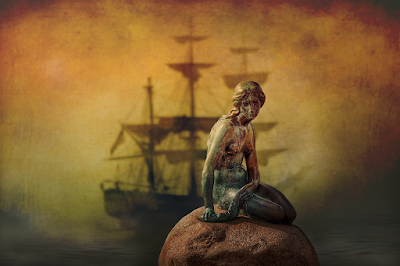
I shoved aside fabrics and ribbons until sunlight entered my field of vision. When I crawled out of the pile and saw half my train crumpled into my maid's arms, I realized she had been helping as well.
"Thank goodness!" she cried. "You're not hurt, are you?"
"I have to speak with Prince Aiden immediately!" I exclaimed, ignoring her question.
"Today is your wedding day, Your Highness. It's bad luck for the groom to see the bride before the wedding."
"It'll be worse luck if I don't!"
"How hard did you hit your head?"
When she realized I wasn't going to give up, she brought me to his room. For one sickening moment when I looked into Aiden's loving eyes, I almost considered giving up the entire operation and claiming my own happy ending. That was when I noticed Coralie, the tragic silver-haired maiden with a look of sadness in her big blue eyes that was deeper than the sea itself. I had to do this. There was no choice.
"I'm sorry, but I can't marry you," I blurted out.
"Helena," said Aiden with so much concern that I nearly burst into tears. "Don't be afraid. You saved me. We were meant to be together."
"You're wrong," I spat, marching to the corner of the room and pushing Coralie to her feet. She winced as I remembered too late that each step she took was like walking on broken glass. "It was her. She saved you. She's the one you love."
"Coralie?" asked Aiden, perplexed. "It couldn't have been her. The girl who saved me sang to me with the most beautiful voice. Coralie can't speak."
The mermaid's big eyes stared me down with confusion, curiosity, and the tiniest hint of hope that I would have missed if I hadn't been looking for it.
"That's because she's a mermaid who traded her voice to walk on land! She sacrificed everything for you, and if you marry me instead of her, she's going to die!" I shouted, realizing I probably sounded like a lunatic.
"I heard about your accident this morning," said Aiden, wrapping a comforting arm around my shoulders. "You must have hit your head pretty hard. I'll get you to a doctor. We can delay the wedding if we need to."
As much as it killed me to resist his warm touch, I yanked his arm away. "It's true! Ask her!"
Aiden sighed and rolled his eyes as though he was doing me a favor.
"Is what she said true?" he asked the girl who was now paler than sheet. She looked at me as though searching for permission. I nodded toward Aiden.
In a gesture that was so delicate it would have made a ballerina look clumsy, Coralie nodded her head and closed her eyes as though she was afraid to see his response.
"Is this some sort of joke?" asked Aiden.
"Of course not! Why would I sabotage my own wedding?"
"Then maybe you're both mad. Have you been conspiring together?"
"With all due respect, Aiden, the poor girl can't talk. How could possibly have been conspiring with me?"
"How would you know all of this even if it were true?"
I swallowed. "I... can't explain it. I just know."
"Right," said Aiden. "You just know. Well, unless you can prove what you're saying, I fully intend to go through with the wedding and get you the help you need."
An idea flashed in my mind. "Wait! I can prove it!" I exclaimed.
I placed my hand gently over Coralie's. "There's a balcony nearby that overlooks the ocean, isn't there?"
She nodded.
"If you go there, you'll find your sisters. They traded their hair the sea witch for a magical knife. Aiden and I will watch you somewhere they won't be able to see us. Then he'll have to believe me."
"What would she need a knife for?" asked Aiden.
"That's not important. If you see that her sisters are mermaids too, you'll believe me, right?"
"Fine," he said, "but if your ridiculous theory doesn't work out, then you'll marry me?"
"Yes," I sighed. "I'll marry you."
Coralie raced to the balcony as Aiden and I crouched in the shadows. At first, the ocean glittered with nothing but seafoam. Then five beautiful figures appeared with sort hair and long glistening tails. They looked warmly upon Coralie as though they were very close and threw her a sheathed dagger that glistened in the afternoon sun. Though we weren't able to hear their words from this distance, Aiden was entranced by the vision. After the five maidens disappeared into the ocean, Coralie turned around and handed me the dagger.
"I don't want this!" I cried. "I'll send it back where it came from."
I tossed the enchanted knife back to the sea, where it landed with a splash.
"Now do you believe me?" I asked Aiden, but he was already holding Coralie's frail form gently in his arms just as he had once held me.
"So it's true? You really traded your voice to find me?"
Coralie nodded, tears filling her eyes. Aiden gently brushed a strand of hair out of her face.
"It was you all along! I don't know how I didn't see it earlier! You're the one I want to marry."
"Finally!" I exclaimed.
Aiden turned around as though he just remembered my presence.
"Helena," he said, taking my hands in his. "I'm so sorry. I've been terrible to you I thought you were someone else, and then I didn't believe you, and now I have no choice but to call off our wedding."
"Are you kidding? This is great! Now Coralie doesn't have to die, and Operation Little Mermaid was a complete success!"
"Operation what?"
"Never mind," I smirked.
As I watched the man of my dreams exchange vows with someone else, I had a feeling of complete and utter content. I had changed the ending of my favorite fairy tale for the better. Maybe I Iost a prince, but there are plenty of fish in the sea. After all, I was still a princess. The world was now my oyster.
If you enjoyed this story, check out my retelling of "The Little Mermaid," Of Land and Sea, which uses the same characters minus the isekai element.
June 6, 2023
"Be Pretty, Girls, and Things Might Work Out."
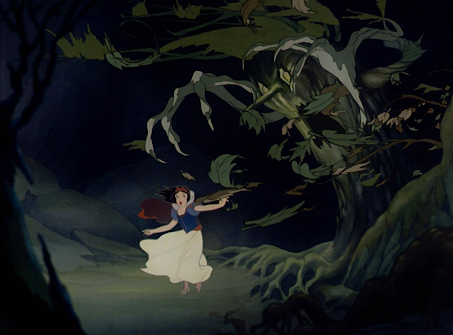
Let's start with the next upcoming live-action remake, Snow White , starring . Some might argue that this movie is a good example of one that needs an update because so much of the story is focused on the protagonist's physical appearance. Is that really what saved her in the end? Nope. Not at all. In fact, the queen's jealous of Snow White's beauty is the very thing that caused her to nearly get killed by the huntsman and then run through the woods on a treacherous trek for her life. But it's okay. After that, the dwarfs and the prince found her and were so taken by her beauty that they took her in told her she'd never have to worry about the queen again, right? Wrong. She had to use her natural goodwill and kindness to convince her animal friends to bring her to safe haven where she needed to earn her keep with a little hard work, similar to a more modern Disney Princess that we know.
Because Barnes' article references this movie in a paragraph about emphasizing diversity, I can't resist wondering if he's trying to make some sort of dig towards people of color by saying they are replacing the "be pretty" message with diversity. I admit this may be a stretch, but saying both of these things in the same article could be interpreted as a claim that diverse people are less beautiful than the white princesses we've seen in older movies, which, of course, isn't true. That's just another reason that Bailey and the remake team need to start rethinking their messaging strategy.
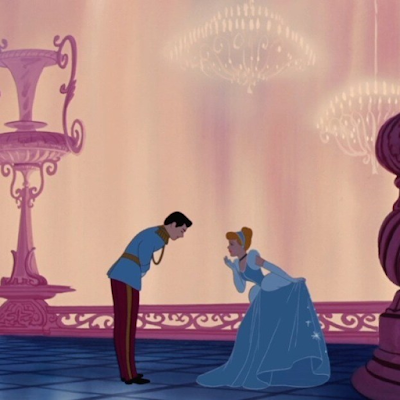
But what about Cinderella? Didn't she get away from her stepfamily solely because the prince was charmed by her beauty, something that the live-action remake tried to correct? This is a harder one. Yes, the 1950 Disney animated classic did have the prince fall in love with her in a single night for seemingly very little reason other than her appearance, but that was not the final message of the movie. If it was, then marrying the prince would have been the only thing Cinderella did in the entire movie. Instead, it showed her day-to-day life doing chores for her family and taking their abuse with a monumental amount of self-control. It was her fortitude in remaining kind and gentle and never breaking down for so long that earned her the chance to become the graceful elegant woman at the ball instead of giving up and submitting to a life of misery. The moral of the story was perseverance, not being pretty, which I don't think is the moral of any story. Of course, there were plenty of other "Cinderella" adaptations that showed her getting to know the prince before the ball as well, so the remake was far from revolutionary.
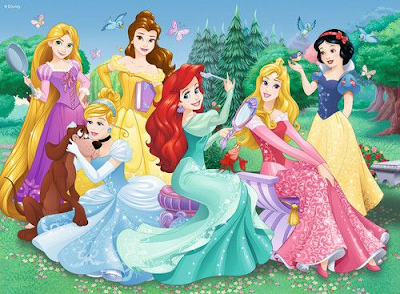
The later generations of princesses were even more blatant in their feminist values, yet that didn't stop Disney from doing second-rate remakes of The Little Mermaid , Beauty and the Beast , Aladdin , and Mulan , claiming that these were more feminist than the originals. As someone who grew up with these animated films, I can attest that the original versions of the characters were just as inspirational, if not more so, than the ones from the remakes, particularly in the case of Mulan. All of the princesses from these movies saved their princes at some point in the original film. Ariel saved Eric from drowning. Belle broke the Beast's curse with the power of true love. Jasmine spoke out against he guards and Jafar for Aladdin's arrest. Mulan took an arrow for Shang. All of these characters were active players in their own story. People are entitled to like or dislike the remakes as they please, but the claim that they fix outdated gender roles from the originals is simply inaccurate.
Disney's live-action remakes continue to be a hotly debated topic, and the recent article on Sean Bailey only add fuel to the fire. While some may argue that remakes serve as an important means for Disney to remain relevant, there are concerns about the messages being portrayed, particularly regarding gender and beauty. However, it's important to note that the original versions of the animated classics were not without their own feminist values, and it's possible for the remakes to achieve both a nostalgic appeal and progressive messaging. At the end of the day, it's up to Disney to weigh the importance of both factors and make decisions that align with their values and audience. What do you think are some of the messages behind the original animated films? Let me know in the comments!
June 4, 2023
Review: Saving Winter
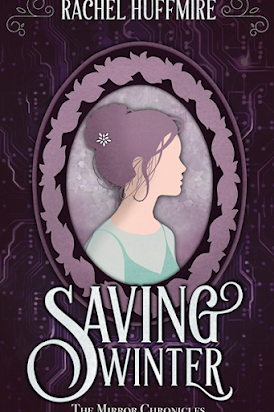
This would normally be the place where I share a brief summary of the story, but I found Saving Winter so confusing that I'm not entirely sure I know what it was about. There was a lot of time travel, some rebellion, and many different characters to follow, none of whom I felt particularly attached to. I've said in other reviews that time travel plots can be tricky to handle, especially for fairy tale adaptations and this book was all over the place. At first, it seemed like it was about a character named Violette forming a rebellion against ITTA, an agency that is similar to the Time Bureau from Find Me in Paris, which is a rare example of a story that combines princesses and time travel in a compelling way, despite its many plot holes. This book is the polar opposite of Find Me in Paris. There was a great deal of effort spent fleshing out each timeline and the mechanics of the world and in doing so, the book left little room for the readers to care about the characters.
Partway through the book, it is revealed that an alternate version of Violette was formed as a result of her time travel escapades, and that version seems to represent the infamous Snow Queen. Closer to the end, the main character switches to a girl named Fleur, who is likely the Gerda character from the fairy tale. Fleur wants to rescue her friend Baigh, who probably represents Kai. This would have been well and good if Fleur and Baigh were more present at the beginning of the story to give readers a chance to care about them. However, they show up so late in the book that I barely knew who they were or why it was so important for her to save him from the evil version of Violette. Not only that, but it seemed like the good version of Violette had been all but forgotten at some point. Either that or she was actually someone else the whole time, and that wasn't very clear either. The whole book was so confusing that I rarely knew what was going on at any given time.
To be fair, I think that reading the first three books in The Mirror Chronicles may have alleviated some of my confusion with Saving Winter. Most series I've read where each book adapts a different fairy tale usually have different protagonists in each book, making the world easy to learn about from anywhere in the series. This series might be a rare exception to that rule. Even so, I found the world unnecessarily convoluted, and the emotional stakes were as cold as the Snow Queen herself, which I suppose was appropriate for such an adaptation. Each chapter of this book becomes progressively more confusing in terms of who to root for and what the characters' motivations are. If it hadn't been for the epitaphs of "The Snow Queen" between chapters, I would have had no idea it was based on a fairy tale.
Overall, Saving Winter by Rachel Huffmire left me feeling underwhelmed and disconnected. While the book follows a noble cause and contains some exciting moments, the confusing plot and lack of personality for the characters made it difficult for me to care about any of them. I think this book is meant as a reward for people who have enjoyed the first three books in the Mirror Chronicles as opposed to an introduction to this convoluted science fiction world. Despite its good intentions, I found myself struggling to stay engaged with the story throughout. While Saving Winter may have some redeeming qualities, I would caution readers to manage their expectations before diving in.
May 30, 2023
Should Ariel Be Able to Write?
One of the most common complaints about Disney's The Little Mermaid that the new remake tried to "fix" is that after Ariel demonstrated she could write by signing her name on Ursula's contract, she never used this method to communicate with Eric when she was mute. In an interview on TikTok, director said that in order to fix this "plot hole," he "wanted to eliminate the whole idea that she can write at all." Instead of signing a scroll, she plucks a scale from her scale to seal the deal with Ursula, giving her no other way to reveal her identity when she meets Prince Eric. The popular YouTube account HISHE (How It Should Have Ended) played with this idea in their recent video, in which Ariel scrawls her entire story to Eric in the sand the moment she meets him on the beach. Even novel adaptations of the fairy tale have incorporated this method of communication for the voiceless mermaid. Is it true that no one who worked on the original 1989 movie thought of this? The answer may surprise you.
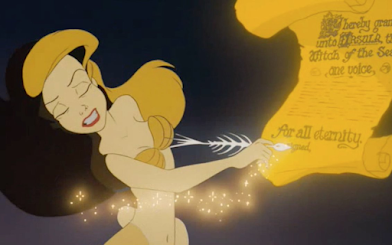
As some of you may recall, one of the newest items in my collection is The Little Mermaid: The Full Film Script from Canterbury Classics. This is more than just the screenplay of the movie. It contains concept art, interviews, production details, and, most notably, the original story treatment that was written by in 1985. For those of you who are unfamiliar with screenwriting, a treatment is a broad two-page summary of a movie that is used as a jumping off point to outline the finer details that will eventually evolve into a hundred-or-so-page script. The original treatment for a film is rarely the exact same story used in the movie by the time a screenplay is completed. Expanding upon each scene for the full-length script inevitably creates story problems that need to be fixed by adjusting various elements of the plot. Therefore, it's no surprise that the ending that was summarized in this treatment was vastly different from the one we saw in the completed film. However, one particular element of it stood out to me that I've never seen anyone use as a defense of this popular plot hole argument.
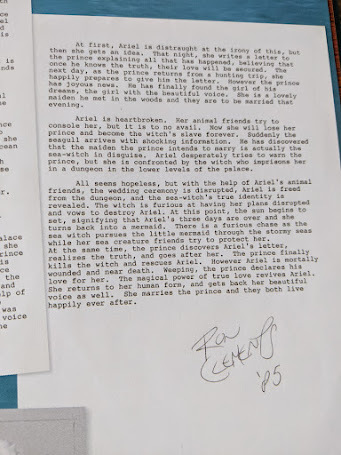
In the original treatment, Ariel writes a letter to Prince Eric that becomes a major plot point leading up to the film's climax, which was a lot more similar to The Swan Princess or Beauty and the Beast than the ending that we ended up with. Some defenders of this plot hole may still argue that Ariel waited too long to write the letter, but if you consider that she only had three days to get Eric to fall in love with her and spent the first day finding her bearings as a human and adjusting to life in Eric's castle, it makes sense that she wouldn't have gotten a chance to sit down, find a writing utensil, and begin penning a letter until the second night, which was when Vanessa entranced Eric. Not only that, but does anyone honestly believes that Eric finding a letter would have been a more exciting climax than the one we got? All Eric needed to figure out that Ariel was the one who saved him was to listen to her voice one time. After she transforms back into a mermaid, reading the letter seems like an extraneous detail that detracts from the action of movie's riveting third act. According to the book, the thrilling climax in which Ursula grows into a giant monster and creates a huge storm was due to 's complaint that the original ending wasn't exciting enough. Even though I'll never forgive him for trying to cut "Part of Your World," he at least had the good sense to realize a letter wasn't very cinematic.
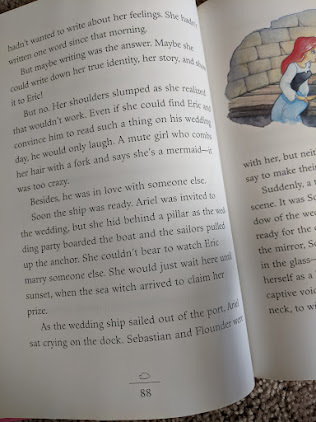
This treatment wasn't the only time that a letter had been incorporated into the Disney version of "The Little Mermaid." The 2003 coffee table book Once Upon a Princess featured diary entries from various Disney Princess characters and included a passage in which Ariel was considering writing a letter to Eric that revealed her identity the day she learned he was going to marry Vanessa, like in the original treatment. However, she decides against it because writing that she was a mermaid under a spell just didn't seem very believable compared to seeing it for himself when the spell broke. And you know what? I think she was right. Imagine if she wrote that to him the first day he met her on the beach. He'd probably think she swallowed a little too much seawater. Plus, giving Eric the opportunity to spend quality time with Ariel without knowing she was under a spell gave him the chance to fall in love with her organically instead of trying to help her fulfill a deal. This is something that was emphasized even more in the live-action remake, regardless of whether or not she had been able to write. Ursula clearly states that Eric must give Ariel "not just any kiss," but "the kiss of true love," which is something that could have only happened after he spent time with her, and not as a result of reading a letter.
What do you think? Does Ariel's ability to write create a plot hole, or would it have no major impact on the story? I personally don't think it makes much of a difference because Eric still needed to fall in love with her for who she was and not just because she was the girl who saved him. He already suspected her true identity several times upon meeting her, and the way that it is ultimately confirmed for him is far more cinematic than reading a letter would have been. Having Ariel sign a contract made more sense in the animated film because it showed that she was aware of and agreed to Ursula's terms, unlike the remake, which makes her forget the terms of the deal right after the spell is cast.
May 28, 2023
Review: The Seven Years Princess
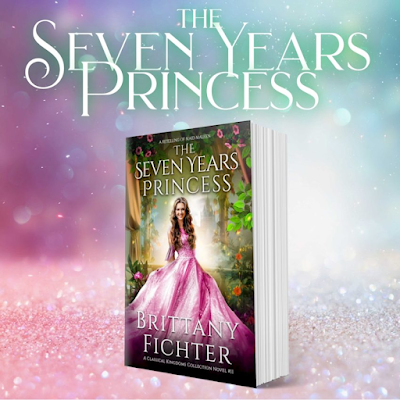
Ever since she was a little girl, Princess Maleen took a liking to Prince Roburts, who belonged to an enemy kingdom. The one person who she could never tell about this forbidden romance was her uncle, who ruled her kingdom with an iron fist. One day, she would come of age to take over the throne and make her own decisions, but that day was far in the future. Her secret remained safely under wraps until Maleen realized how determined her uncle was to start a war and made a public impromptu announcement about her betrothal to the prince, hoping it would end the struggle between the two kingdoms. Instead, her uncle was so enraged by this announcement that sentenced her to imprisonment in an isolated tower for seven years until she came of age. Maleen was not alone in this tower. A servant named Jalyna was trapped with her to take care of the princess during these lonely years, but it turned out to be very much the opposite as Maleen was forced to do her best to make sure Jalyna didn't starve herself to death from despair.
Many of Brittany Fichter's earlier adaptations change certain details about the story to expand upon the world so it matches her darker style of storytelling. This story was already dark enough that she didn't need to change much, which served as both an advantage and a disadvantage. There were just enough additional details for Maleen's relationship with Roburts to feel genuine and to understand the intent behind Maleen being locked up for so long. Yet, the seven years passed by so quickly in the book that it was difficult to understand why neither Maleen nor Roburts could find a way to get her out of the tower any sooner. Though the book elaborates a bit upon both of their attempts to add a sense of realism to the story, they don't seem to be seven years worth of attempts, which is a very long time to try to accomplish something. It seemed like it only took seven years because that's what the fairy tale said it would take as well as when Maleen would come of age. I like that she was a more active character in this adaptation, but doing so took away from the believability of how long it took her to escape.
The other aspect of the story that was harder to swallow was the love triangle that Maleen found herself in upon escaping. In the fairy tale, the prince's new bride forces Maleen to switch places with her because she does not know that Maleen is his former lover and doesn't want the world to see how ugly she is. Here, Priscilla knows exactly who Maleen is and uses her powers to make Maleen look like her and marry Roburts in her place because she does not want him to discover that she was tainted by dark magic. Even though Maleen asks her why she can't use magic on herself and marry him, the explanation she gives doesn't make that much sense. Much of this is attributed more to the original fairy tale than this specific adaptation, though. It seems odd that any bride would want to manipulate a former lover of her betrothed into marrying him in her place and then get angry about the two actually being in love after their nuptials. Brittany did the best she could in making sense out of the material she had to work with, and I appreciate how faithful she was to the original fairy tale while adding just enough new content to flesh out the world and characters.
The Seven Years Princess fits perfectly into Brittany Fichter's unique collection of dark fairy tale retellings. There could not have been a better story to match her writing style than "Maid Maleen." I will surely remember this obscure Brothers Grimm fairy tale for years to come thanks to this book. It does an excellent job of developing the characters and allows us to experience their long struggle for freedom, love, and peace among their kingdoms. However, the book struggles to explain away some of the more confusing elements of the fairy tale that may make it difficult for readers to fully suspend their disbelief. I recommend this story to people who enjoy darker fairy tale adaptations and are looking for a story that hasn't already been retold a million times.



